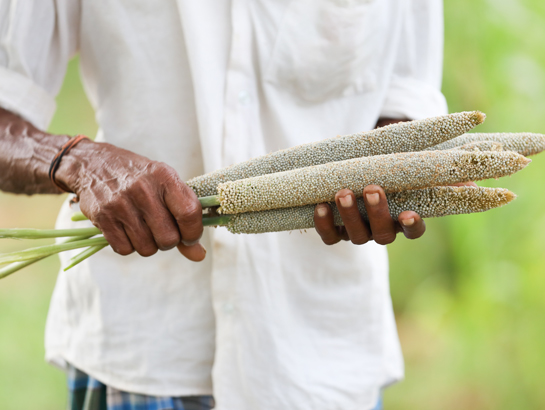Malnutrition is widespread among women, children and adolescents in Telangana state. Stunting, wasting and micronutrients deficiencies have profound effects on immunity, growth, and mental development of children. National Family Health Survey-5 conducted in 2019-20 revealed that 33 percent of children under five years of age were stunted while 70 percent were reported as anemic. Similarly, 58 percent of women of reproductive age (15-49 years, non-pregnant) were found anemic and 53 percent pregnant were anemic.
A new pearl millet hybrid recently became available for farmers to grow in Telangana state of India. The release marks a significant milestone for Telangana, offering a promising solution to nutritional challenges while empowering farmers with enhanced productivity and resilience.
Palem Sajja 1625, a novel pearl millet hybrid with high iron and zinc was developed in partnership with Professor Jayashankar Telangana State Agricultural University (PJTSAU), International Crops Research Institute for the Semi-Arid Tropics (ICRISAT), HarvestPlus, and its partners. The new pearl millet hybrid has several desirable characteristics, which could significantly attract farmers to grow and scale up the availability of nutritious crop and foods to consumers in the state.
The nutritional superiority of the variety is remarkable as it contains essential nutrients, particularly iron and zinc, crucial for maintaining physical and cognitive health. The hybrid has approximately 77 ppm of iron and 58 ppm of zinc as compared to the assumed national baseline of 42 and 32 ppm, respectively. Additionally, it contains significant amount of calcium which will be helpful to improve nutritional value to combat prevalent deficiency, especially in women and children.
Palem Sajja 1625 demonstrates a remarkable yield advantage over the check hybrid. With an estimated yield of 2.2 tons per hectare, it stands nearly 22 percent higher than check hybrid. The increased yield will significantly contribute to improving the food security as well as economic well-being of farmers, making it an attractive choice for cultivation in the drylands of Telangana.
The hybrid incorporates resistance against downy mildew disease, ensuring greater resilience and reduced dependency on chemical inputs. Additionally, it matures early by completing its growth cycle in 80-85 days, as compared to the typical 90-95 days of other hybrid pearl millet. This enhances its suitability for rain-fed agriculture and mitigates risks associated with climate variability. The release of Palem Sajja 1625 is the outcome of collaborative efforts aimed at creating sustainable solutions for climate smart agriculture, economic empowerment, and improved nutrition in Telangana state of India.
